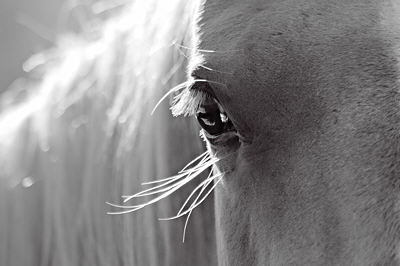From The art of looking sideways, by Alan Fletcher.
I shut my eyes in order to see. – Paul Gauguin
It is only with the heart that one can see rightly. What is essential is invisible to the eye. – Antoine de Saint-Exupery
I paint what I know, not what I see. – Pablo Picasso
What you see is what you see. – Frank Stella
Seeing is not believing. Believing is seeing. – Robert Pirsig


The first three comments address the same theme – the eye of the mind – different from that of last two.
The last two present opposite points of view from one another – science versus religion.
b + T,
I agree about the first three, but have a different twist on the last two. At least for this morning.
I think one could place the Pirsig quote with the others if we take believing as the understanding or commitment of the mind. Believing is seeing with the mind’s eye, i.e. in a deeper way than with only the sensory eye. Admittedly, many of our musings on A&P are about how there’s no clear separation of these.
As for Stella, I think the occasion was fending off requests to explain his minimalist black paintings. I don’t know whether he was denying they had any meaning, or saying that the meaning had to be found by the mind of the viewer, and couldn’t be specified in words.
Steve,
I agree with your interpretation of the last quote.
After reading what you now said about Stella, I like his quote the best.
I am at work. Tolla, resting at home, may think or feel differently.
Great horse photo!
Changing the subject a little bit, I just saw the new George Clooney movie, “Michael Clayton” and there is a beautiful scene about the quiet presence of horses, and what man can learn from them. If you get a chance, I recommend it.
Okay, back on topic, I think for me the only open-ended quote, the one I can go places with in my imagination, is the first one:
I shut my eyes in order to see.
The others start dealing in absolutes that don’t leave much wiggle room.
Martha,
What an excellent point, I have to agree. Though there is uch a strong tendency to pronounce is absolute language, that I tend to ignore the absolutism and just ponder the thought for what I can gain from it. But spirit matters; thank you for your insight.
Steve,
“Seeing is forgetting the name of the thing one sees” — maybe the worst title for the best book I’ve read in a long time. It’s Lawrence Weschler, of course, writing about Robert Irwin. More about Irwin this coming Friday if you are lucky.
But about seeing — I was reading something about Irwin where he said (I paraphrase) that just to understand perception, it might be worth listening to everything in your environment, all the time, for a week. I tried it, and quickly realized that the only way I could really hear everything (that is to say, everything that physically I _could_ hear) was to close my eyes. My vision interfered with the more subtle sounds unless I cut it off.
So I’m wondering if, to see completely, one plugged one’s ears, or added a total white noise, if our perception of what we see would change or enlarge or expand.
BEyond that, I could only hear “all” when I concentrated on hearing all — like a “hearing” meditation.
June,
Just thinking about the experiment you describe made me realize a difference between seeing and hearing as modes of sensing. Considering just the physical input: with hearing you cannot help but hear everything around you, whereas with seeing you can only see what you train your eyes on. True, once one gets to the mental level, the notion of attention matters in both. I’m going to be trying this out.
More Irwin would be great. From the recent NY Times article concerning Irwin’s work in San Diego: “he talks most of all about the purpose of art, as a vehicle for attuning or retuning individual patterns of attention and perception.” Though his talk is fascinating, the experience of his work must be so much more. “An exhibition for me is not a statement but an experiment.”
June:
That is soo Carlos Casteneda. Don Juan keeps hammering on the theme that hearing is deeply implicated in one’s perception of those separate realities.
Jay,
Good grief, it’s been eons since I thought of Carlos Casteneda — I was in my practical/materialist marxist 1960’s mode when I first encountered him and so blew him off as just another whoo-whoo.
Should I re-examine (now that I’m in my 6th decade and have turned into a bit of a whoo-whoo myself)?